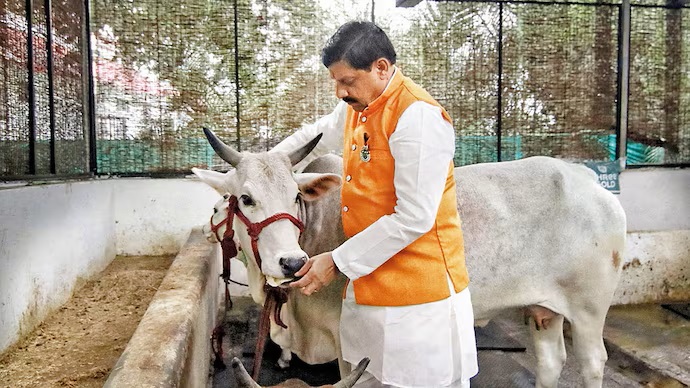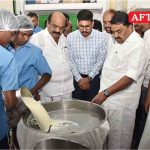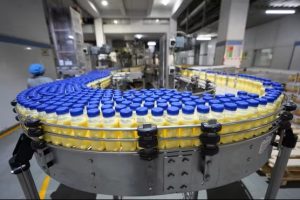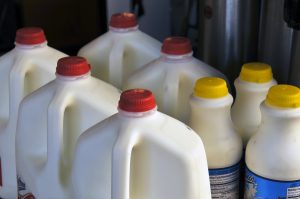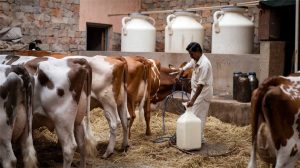
The state government’s move to hand over management and operational control of the state dairy federation to the NDDB has come for criticism.
Forget cow politics, even milk has reached boiling point in Madhya Pradesh. The trigger: the state government’s decision to hand over control of the MP State Cooperative Dairy Federation (MPCDF) to the National Dairy Development Board (NDDB) for five years has come under fire. The cooperatives department has almost finalised the modalities of the transfer, after which an MoU will be signed between the two entities. The move has attracted criticism from the opposition Congress which alleges it is to facilitate the ‘backdoor entry’ of Amul into the state and swamp inhouse brand ‘Sanchi’.
Madhya Pradesh is the third largest producer of milk in the country, after UP and Rajasthan, and there is immense scope for growth in the sector. Officially, the state government maintains the decision to hand over management and operational control to the NDDB is to strengthen the Sanchi brand, make it competitive and infuse fresh life into it. But why now? Well, the annual turnover of the state’s milk cooperatives stands at Rs 2,200 crore and insiders claim there has been little growth in the past few years. The state dairy cooperative collects around 1.05 million kg of milk every day, but collection has not been increasing as expected.

Currently, the milk cooperative sector in MP has a three-tier structure, pertaining to milk aggregation. The dairy cooperative societies at the outermost layer mostly collect milk from around 11,000 villages while, in the second tier, the milk unions located in Bhopal, Indore, Ujjain, Sagar, Jabalpur and Gwalior are involved in processing the procured milk. At the apex is the MPCDF with its brand Sanchi that exercises administrative control over the unions and primary bodies. It also helps in marketing the products.
Among the milk unions, Bhopal, Indore, Ujjain and Sagar are doing reasonably well, posting profits of around Rs 20 crore, which are ploughed back to livestock owners. The Gwalior milk union has accumulated losses of some Rs 40 crore while Jabalpur has run into financial trouble recently, mainly due to some ambitious projects that did not fructify.
Meanwhile, the NDDB, a central organisation based in Anand, Gujarat, has been getting some bad press here, mostly due to its geographical location—it’s also the headquarters of Gujarat Cooperative Milk Marketing Federation brand Amul. The fact that the latter is in major expansion mode in the state doesn’t help. Unofficially, those in the know claim the decision to hand over the state cooperative’s reins to NDDB may in fact help check Amul which, in the past three years, has reportedly increased its daily milk collection by six times in MP. The state dairy federation also has an HR issue; it has not made major recruitments for the past many years. Out of the six milk unions, only Indore has an elected body as mandated while the rest and the state body are run by bureaucrats.
What would the NDDB do once it takes over? It has to recruit 50-60 mid- to senior-level executives to fill up vacancies and would pay their salaries. A consultancy fee the NDDB charges usually has been waived, as have supervision charges levied at 4-6 per cent of project cost. Many of the plants owned by the state dairy federation are old and the NDDB is expected to bring in new technology and plants. The cost of the plants, however, would be borne by the milk unions through low-interest loans.

In the past, there have been a few inhouse attempts to strengthen the Sanchi brand. After the state dairy federation was set up in 1980, it soon began manufacturing ghee. The period a decade later saw a diversification in product range with the introduction of butter, butter milk, flavoured milk, pedas and now even ice cream and coconut milk. The brand, however, has not been able to make an impact anywhere comparable to Amul outside MP.
The NDDB has in the past taken over other state milk cooperatives to strengthen them. Rajasthan, Jharkhand, Assam, Maharashtra and Karnataka are some states where the NDDB took up this role. Why then does the Opposition have an issue with the takeover? “The laws pertaining to cooperatives do not allow taking over of administrative control of a running cooperative body. There are no issues with the NDDB performing a supervisory role, being a consultant and financing initiatives, but it should not take over the management. This will severely damage the cooperative movement,” says Congress Rajya Sabha MP and senior lawyer Vivek Tankha.
A key reason could also be the insecurity around a potential loss of jobs to existing staff. “The state dairy cooperative currently has around 700 permanent employees while it needs around 2,000 to function efficiently. The CM has assured employees that there would not be any loss of jobs due to the takeover. Why would jobs be taken when the NDDB needs more people on board?” asks Sathish Kumar S., MD of the MPCDF. Some of the anxiety apparently arises from what happened in Maharashtra and Karnataka where the NDDB had been called in to overhaul local milk cooperative operations and was, some say unfairly, targeted for the Gujarat connection. Karnataka had seen a huge controversy erupt in 2023 during election time with allegations being made, again, that it was an underhand move to allow Amul to make inroads at the cost of local brand Nandini. In Maharashtra earlier this year, the takeover of Mahanand Dairy by the NDDB had elicited charges of land grab and job losses besides the usual plaint of business moving to Gujarat at the expense of the local industry.
CM Mohan Yadav, though, dismisses the allegations, saying the takeover would help enhance incomes of dairy farmers. Currently, average per capita availability of milk in MP is 644 gm (national average is 459 gm), and the state is targeting a doubling of milk production in five years, says Yadav.
Meanwhile, political analysts also see the proposed takeover as a move to strengthen the CM’s hand involving identity politics and his own Yadav community. They point to how there has been a substantial increase in allocations to the animal husbandry department in the 2024-25 budget. “The NDDB is a respected body and I think the takeover would help dairy farmers in MP, especially since there have been issues with Sanchi,” says senior journalist N.K. Singh. “However, there is a downside—an inhouse brand will in the short term be weakened and this could lead to other players in the sector becoming stronger.”
The dairy sector’s potential was recognised even by former BJP chief minister Shivraj Singh Chouhan, with his sons embarking on a dairy business some years ago. Will CM Mohan Yadav be the next to milk its potential? One will have to wait and watch.
You can now read the most important #news on #eDairyNews #Whatsapp channels!!!
🇮🇳 eDairy News ÍNDIA: https://whatsapp.com/channel/0029VaPidCcGpLHImBQk6x1F
